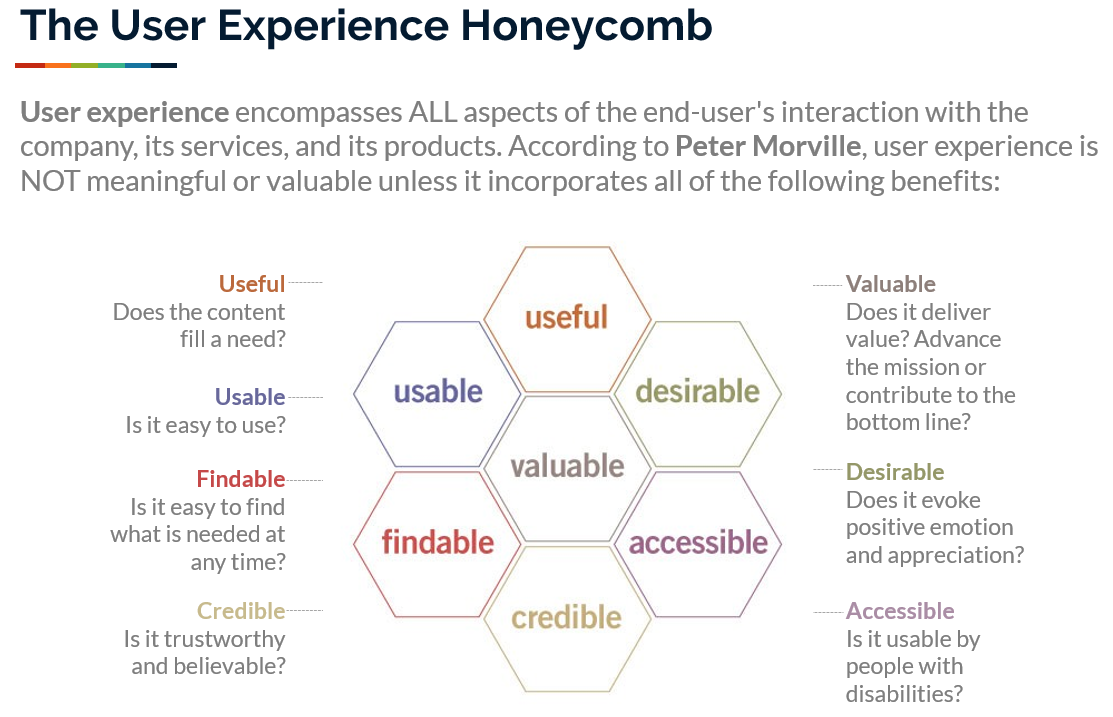

UX: User-Centered Analysis and Conceptual Design Training
2 days (10:00 AM - 5:00 PM Eastern)
$750.00
Register for a live online class.
Details
Subjects Covered
Prerequisites
Setup Requirements
Details
Course Details
An empathetic, user-centered analysis is a basis for interface design that makes sense to the user. With a clear definition of user requirements, developers and designers can create more effective and usable software interface designs. In this course, you will learn the methods and concepts to analyze user-centered requirements—the foundation for designing user-centered interfaces, content, applications, and websites.
This course is designed for UX researchers, UX designers, usability practitioners, website and application developers, interface designers, and project managers.
Subjects Covered
- Foundations of User-Centered Design
- Defining User-Centered Design (UCD) and Its Principles
- UCD vs. Design Thinking: Contrasts and Connections
- When and Why to Use User Research
- Understanding Return on Investment (ROI) in UX
- Introduction to User-Centered Analysis (UCA)
- User Testing vs. Usability Testing
- Qualitative vs. Quantitative Research
- The Importance of Context: Client and Industry Analysis
- Stakeholder Engagement and Research Planning
- Identifying Stakeholders and Their Roles
- Stakeholder Management Strategies
- Conducting Effective Stakeholder Interviews
- Aligning Business and User Goals
- Planning Your Research: Objectives, Constraints, and Ethics
- The Researcher’s Mindset
- The Role of the UX Researcher
- Embracing Objectivity and Intersubjective Knowledge
- Understanding and Mitigating Bias
- Types of Cognitive Biases (e.g., Confirmation, Framing, Social Desirability)
- Avoiding Researcher Influence: Best Practices
- Ethical Considerations in Research
- Conducting Qualitative User Research
- Designing a Research Plan
- Recruiting Participants: Strategies and Screeners
- Crafting an Interview Guide
- Conducting 1:1 Interviews
- Building Rapport and Active Listening
- Interviewing for Empathy and Insight
- Focus Groups
- Competitor Studies
- Analyzing Qualitative Data
- Story Share-and-Capture Sessions
- Grounded Theory and Thematic Analysis
- Conducting Quantitative User Research
- When to Use Quantitative Methods
- Defining Metrics and Statistical Significance
- Designing and Distributing Surveys
- Gathering Rich Data in an Actionable Format
- Triangulating Data with Qualitative Insights
- From Data to Insight
- Synthesizing Research Findings
- Creating Empathy Maps and Journey Maps
- Visualizing Pain Points and Emotions
- Mapping Touchpoints and Interactions
- Setting User-Centered Goals
- Defining Problem and Mission Statements
- Using “How Might We…” and Laddering Techniques
- Hypothesis Generation and Prioritization
- Introduction to SMART UX Metrics
- Personas
- Purpose and Power of Personas in UX
- Creating Meaningful, Data-Driven Personas
- Elastic vs. Concrete Personas
- Persona-Driven Decision Making
- Scenarios and Storyboarding
- Using Scenarios to Frame User Needs
- Writing High-Quality Scenarios
- Visualizing Scenarios through Storyboards
- Content Strategy in Conceptual Design
- Defining Content Strategy in UX
- Key Components: Substance, Structure, Workflow, and Governance
- Aligning Content with User Motivations and Business Goals
- Developing Fact-Based Personas for Content Planning
- Using Content Models and Mapping Flows
- Creating Style Guides, Templates, and Governance Structures
- Voice, Tone, and Accessibility Considerations
- Measuring Content Effectiveness
- Prototyping Concepts and Testing Ideas
- Low-Fidelity Prototyping: Paper and Sketches
- High-Fidelity Prototyping: Tools like Figma, XD, and Sketch
- Incorporating Research into Prototyping Decisions
- Iterative Testing and Feedback Loops
Prerequisites
Before Taking this Class
UX: A Deep Dive into UsersSetup Requirements
Software/Setup For this Class
None
Onsite Training
Do you have five (5) or more people needing this class and want us to deliver it at your location?

